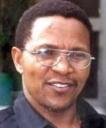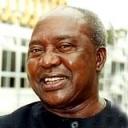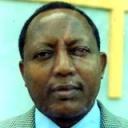President Benjamin Mkapa will retire gracefully, as has become the custom amongst presidents in Tanzania, at the end of his second term and a new president will be elected on October 30, 2005.
During recent weeks, in an atmosphere of increased political excitement, eleven leading politicians, seeking to obtain the coveted nomination as candidate of the ruling Chama cha Mapinduzi (CCM) Party have been criss-crossing the country in search of support from party members. The weakness of most of the 16 opposition parties (compared with the 294 political parties which took part in the British general election!) and their apparent determination not to cooperate to beat CCM almost guarantees that there will be another CCM president – the fourth since independence in 1961.
It is worth noting that the field is not as crowded as analysts had predicted it would be. In fact, the 11 aspirants fall far short of the 17 hopefuls who entered the party’s nomination race ahead of the 1995 elections after which Ali Hassan Mwinyi stepped down as president after two consecutive five-year terms in office.
The Procedure. To be nominated as a CCM candidate for the presidency it is necessary to pay a deposit of Shillings 1 million and have the written support of 250 people from each of eight mainland regions plus two Zanzibar regions. CCM members in the constituencies first sign up for the candidates they prefer and then the CCM National Executive Committee (225 members) sorts these out and submits the names of five of the most popular candidates to the 36- member Central Committee. This committee then hears individual presentations and submits the names of three candidates to the party’s Congress in Dodoma which was due to make its final choice from April 29 to May 5. However, just before the final date for submissions, allegations arose of bribery by some candidates eager to obtain the necessary number of supporters and CCM Headquarters immediately launched an enquiry, the results of which might mean the elimination of some candidates.
The candidates. Although opinion polling is in its infancy in Tanzania it became apparent just before this issue of TA went to press that there were four probable front runners for the presidency of the republic. These were:
Minister of Foreign Affairs and International Cooperation Jakaya Kikwete (53) who started his career in the army and later became Minister of Finance. He made it clear that he felt that he had the right to be selected as CCM’s candidate because, although he was the first choice of the CCM delegates in the 1995 elections, he stood down at the request of Mwalimu Nyerere, accepting that he was too young and would have another chance. He has loyally supported President Mkapa for nine years and felt that it was now his turn. He is a Muslim but has also supported Christian charitable efforts. He exudes a lot of charm and is popular amongst the youth – a significant factor where the median age of the population is 17 -18 years. He is an economist by training and is said to be respected in the World Bank. As he toured the country seeking support he was greeted by large crowds everywhere. When he arrived in Iringa he quickly obtained over 1,000 endorsements while many of his fellow candidates were struggling to reach the 250 mark.
Dr Salim Ahmed Salim (63) the Chairman of the Mwalimu Nyerere Foundation has had a star-studded career having been Tanzanian Ambassador in several countries, Minister of Foreign Affairs, Prime Minister, Minister of Defence and having served for an unprecedented three terms as Secretary General of the OAU. If he made mistakes in Addis Ababa they are not well known about at home. He is articulate and has a refreshingly open personality and a good reputation internationally. His long absences overseas have meant that he is not tarred with the brush of corruption which allegedly affects some other CCM leaders. He almost became President twice before. Firstly, in 1980, having been President Nyerere’s first choice as his successor but he came up against strong opposition from senior CCM cadres and was the subject of some in-fighting in his native Zanzibar. In 1994 Nyerere asked him to come back to Tanzania to accept nomination in the country’s first multi-party elections but he declined the offer as he was so heavily involved in the OAU. His candidacy has its weaknesses. Because he has been away so much he is not so well known in the country and may not appeal to the rural masses nor to the younger generation – some CCM youth groups declared that they would not work for the party in the elections if Kikwete was not chosen.
The veteran CCM Vice-Chairman (Mainland) John Malecela (71) also made it clear that he felt that he had the right to the nomination. He is a former Prime Minister, Minister of Foreign Affairs, Minister of Transport, Minister of Agriculture and High Commissioner in London. He is a powerful political operator and seemed likely to mobilize considerable support amongst the older generation but his determined efforts in 1985 and 1995 to be chosen as candidate were vetoed by Nyerere who accused him of corruption.
Prime Minister Frederick Sumaye is around 60 and comes from the Arusha Kilimanjaro area. He ran the Tanzania Agricultural Engineering Training and Research Centre before being plucked out of obscurity nine years ago by Mkapa and is now the longest serving prime minister in independent Tanzania’s history. He stressed that he had a particular appeal to the peasants because of his background in agriculture. There have been allegations about his acquisition of land belonging to peasants in the Dodoma region but the Attorney-General explained that it was his wife who had the lease on the land. President Mkapa said that it was a good thing for leaders to take part in farming and that under the Zanzibar Resolution of February 1991 it was legal for leaders to acquire land.
Other candidates who appear to have less chance of gaining the nomination are:
Minister for Communications and Transport Professor Mark Mwandosya; Dr Iddi Simba, former Minister of Industry and Commerce and former head of the East African Development Bank who would have been a strong contender but had to resign from government after allegations of irregularities (which he strongly denied) in sugar importation; Ambassador in Moscow Patrick Chokala; Minister of State (Planning and Privatisation) Dr Abdallah Kigoda; one time member of the NEC John Shibuda; Dr William Shija MP; and, Tanzanian Ambassador in Germany Ali Abeid Karume, a brother of the Zanzibar President.
One opposition candidate, Professor Ibrahim Lipumba, an economist who leads the Civic United Front (CUF), has an outside chance of winning the election because his party is well organised and is making progress. He was the Economic Adviser to former President Mwinyi who began the liberalisation of the country’s economy. He came third after the CCM candidate in the 1995 elections and second in 2000. This time he said he thought he would be lucky. He has promised a government of national unity, to prosecute corrupt leaders, to sell the newly purchased presidential jet and use the money to buy insecticide-treated mosquito nets and to provide free school meals.
– information from contributors and also from ‘Africa Confidential’.
Will the candidate selection and the October elections be free and fair? There have been a number of significant changes on the electoral scene since the 2000 elections which should go far to prevent the alleged rigging which took place then especially in Zanzibar. Throughout the candidate selection process however there have been allegations of political horse-trading, Takrima (hospitality provided by candidates to their supporters), intrigue, and shady deals.
Meanwhile the Express reported that the leading opposition party, the Civic United Front (CUF) was preparing agents, equipped with motor-bikes and mobile phones to check on possible vote thefts. The introduction of Permanent Voters’ Registers and special voting cards bearing photographs of the prospective voters, should minimize chances of people voting more than once. Unless the Electoral Commission finally announces election results which contradict the ballot tallies in the constituencies (as was the suspicion in the 1995 Zanzibar Presidential election), rigging might have become a problem of the past.
Will they be peaceful? Even on the mainland some observers are worried that there might be violence although previous elections have been largely peaceful.
The local elections held on the mainland in November 2004, did witness some isolated violence. One person was killed and many injured. There were several cases of destruction of property and the CUF HQ in Dar es Salaam was attacked by young CCM activists disappointed by the results of the elections in poorer parts of the city. CCM was easily able to win overwhelmingly, partly because of its 10-house cell structure giving it an element of control especially in the villages. But the opposition parties were pleased with the advances they made and CUF claimed a 250% increase the number of seats gained compared with previous elections.
Strengthening the Executive. Parliament has passed a 14th Amendment to the union constitution reinforcing the power of the executive. Neither the Speaker of the House nor the Chief Justice will continue to act as President in his absence and the line of succession will in future include firstly, the Vice-president of Tanzania and secondly the Prime Minister. However, to the disappointment of MP’s of many parties, independent candidates will still not be allowed to be candidates in elections. Opposition members walked out of the House in protest.
The opposition
CUF, the strongest party, is significantly better organised than it was last time and has put a lot of effort into mobilizing supporters all over the country. It hopes to put up parliamentary candidates in every constituency.
Chama cha Demokrasia na Maendeleo (CHADEMA) is choosing its presidential candidate from four who have collected application forms. It hopes to have 100 parliamentary candidates. Chairman Freeman Mbowe, MP for Hai, was quoted in the Guardian as saying at one meeting that there was no way the opposition could oust CCM from power if it did not unite. “People have expressed their willingness to support the opposition but we, the leaders, are a hindrance. Why are we so selfish to the extent that we don’t care about the people’s needs?” he said amid cheers from the crowd. But he criticized the country’s laws saying that they did not support the desire of some political parties to unite their forces. Election laws barred parties from fielding a presidential running mate who was not in the same party as the presidential aspirant. All sixteen political parties have signed an agreement aimed at establishing a code of conduct to guide their day-to-day activities. Registrar of Political Parties John Tendwa, who was the architect of the document, said contrary to the election code of conduct, which set standards for political parties during election periods only, the proposed code would make the parties responsible at all times.
The Tanzania Labour Party (TLP) has nominated Augustine Mrema as its presidential candidate but he has been involved in continuing legal disputes for several weeks.
Ten small opposition parties are trying to agree on one presidential candidate to represent them all.

 Jakaya Kikwete
Jakaya Kikwete Salim Ahmed Salim
Salim Ahmed Salim John Malecela
John Malecela Frederick Sumaye
Frederick Sumaye